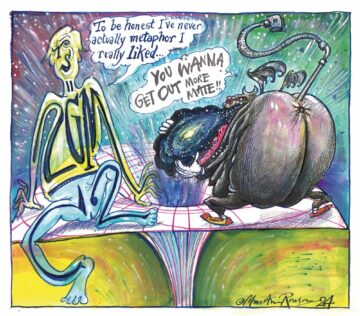Tasneem Zehra Husain in New Humanist:
 If science has a native tongue, it is mathematics. Equations capture, precisely, the relationships among the elements of a system; they allow us to pose questions and calculate answers. Numerically, these answers are precise and unambiguous – but what happens when we want to know what our calculations mean? Well, that is when we revert to our own native tongue: metaphor.
If science has a native tongue, it is mathematics. Equations capture, precisely, the relationships among the elements of a system; they allow us to pose questions and calculate answers. Numerically, these answers are precise and unambiguous – but what happens when we want to know what our calculations mean? Well, that is when we revert to our own native tongue: metaphor.
Why metaphor? Because that is how we think, how learn, how we parse the world. Metaphor comes from the Greek metaphora, a “transfer”; literally a “carrying over”. The very act of understanding (from the Old English: to stand in the midst of) implies the existence of a “between”, a bridge between new and known. In effect, a metaphor. How could it be otherwise? How else can we assimilate a new piece of knowledge, other than by linking it to something we already know? In doing so, we weave a web. When we wonder what something means, what we’re really asking is: what will it impact? If I pull on this thread here, where will my web tighten, where might it unravel?
When we can’t find a suitable metaphor to describe our scientific reality, we run into problems. Take, for instance, quantum mechanics. Most of the devices we use every day are built upon eerily accurate calculations made using quantum theory. Operationally, the theory is wildly successful, yet no one can make complete sense of it. Even scientists who wield the equations with ease don’t claim to truly understand quantum theory; we still don’t have a metaphor that works.
More here.
